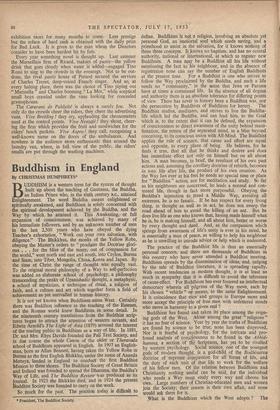Buddhism in England
By CHRISTMAS HUMPHREYS* BUDDHISM is a western term for the system of thought built up about the teaching of Gautama, the Buddha, an Indian Prince who, in the sixth century B.c., attained Enlightenment. The word Buddha means enlightened or spiritually Awakened, and Buddhism is solely concerned with the spiritual development achieved by the Buddha, and the Way by which he attained it. This Awakening, or full expansion of consciousness, was achieved by many of his immediate followers, and by an unknown number of men in the last 2,500 years who have obeyed the dying Teacher's exhortation, " Work out your own salvation, with diligence." The Bhikkhus, the monks of the Yellow Robe, obeying the Master's orders to " proclaim the Doctrine glori- ous . . . for the bliss of the many, out of compassion for the world," went north and east and south, into Ceylon, Burma and Siam; into Tibet, Mongolia, China, Korea and Japan. By the time of Christ the range of thought was equally vast. To the original moral philosophy of a Way to self-perfection was added an elaborate school of psychology, a philosophy transcending the peaks of Upanishadic thought, a metaphysic, a school of mysticism, a technique of ritual, a religion of faith, and a culture and art which together form a field of achievement as yet unrivalled in human history.
It is not yet known when Buddhism came West. Certainly there was Buddhist influence in the teaching of the Essenes, and the Roman world knew Buddhism in some detail. In the nineteenth century translations froin the Buddhist scrip- tures began to attract the attention of western savants, and Edwin Arnold's The Light of Asia (1879) aroused the interest of the reading public in Buddhism as a way of life. In 1881, Dr. and Mrs. Rhys Davids founded the Pali Text Society, and in due course the whole Canon of the older or Theravada school of Buddhism appeared in English. In 1907 an English- man, born as Allan Bennett, having taken the Yellow Robe in Burma as the first English Bhikkhu, under the name of Ananda Metteya, landed in England to conduct the first Buddhist Mission to these shores. The Buddhist Society of Great Britain and Ireland was founded to spread the Dhamma, the Buddha's Way of Life, and The Buddhist Review was produced as its journal. In 1923 the Bhikkhu died, and in 1924 the present Buddhist Society was founded to carry on the work.
So much for the past. The position today is difficult to * President, The Buddhist Society. define. Buddhism is not a religion, involving an absolute yet personal God, an immortal soul which needs saving, and a priesthood to assist in the salvation, for it knows nothing of these three concepts. It knows no baptism, and has no central authority, national or international, at which to register new Buddhists. A man may be a Buddhist all his life without mentioning the fact to his neighbour, and in the absence of registration none can say the number of English Buddhists at the present time. For a Buddhist is one who strives to follow the Way proclaimed by the Buddha, and such a life needs no " community," in the sense that Jews or Parsees have at times a communal life. In the absence of all dogma and authority there is an absolute tolerance for differing points of view. There has never in history been a Buddhist war, nor the persecution by Buddhists of Buddhists for heresy. The Buddhist studies, meditates, and strives to live the Buddha- life which led the Buddha, and can lead him, to the Goal which is, to the extent that it can be defined, the expansion of consciousness to direct awareness of the unity behind mani- festation, the return of the separated mind, in a bliss beyond conceiving, to its conscious union with All-Mind. The Buddhist applies the rule of science, that cause and effect are equal and opposite, to every plane of being. He believes, for he finds it true, that all that he thinks and desires and does has immediate effect not only on himself but on all about him. A man becomes, in brief, the resultant of his own past actions and, assuming the corollary doctrine of rebirth, becomes in toto, life after life, the product of his own creation. As the Way lies ever at his feet he needs no special time or place for " Buddhist " action, nor for meditation and study. So far as his neighbours are concerned, he leads a normal and con- tented life, though in fact more purposeful. Obeying the Buddha's injunction to tread a Middle Way, avoiding all extremes, he is no fanatic. If he has respect for every living thing, in thought as well as in act, he does not sweep the road ahead of him to avoid the killing of an ant. But he does live life as one who knows that, having made himself what he is, he is making himself, and all about him, better or worse by every thought and deed. And, as the compassion which springs from awareness of life's unity is ever in his mind, he. is essentially a man of peace, as willing to help his neighbour as he is unwilling to intrude advice or help which is undesired.
The practice of the Buddhist life is thus an essentially personal concern, and there are thousands of Buddhists in this country who have never attended a Buddhist meeting. Buddhism spreads by the dissemination of ideas, and, judging by the sale of Buddhist literature, it is spreading rapidly. With recent tendencies in modern thought, it is at least so much in sympathy that it is difficult to avoid the inference of cause-effect. For Buddhism has ever fostered an intellectual democracy wherein all pilgrims of the Way move, each by his chosen " vehicle " or means, to the same Enlightenment. Is it coincidence that men and groups, in Europe more and more accept the principle of free men with unfettered minds who move in harmony to a given end ?
Buddhism has found and taken its place among the reign- ing gods of the West. Alone among the great religions " it has no fear of science. Year by year the truths of Buddhism are found by science to be true; none has been disproved. Nor is it fearful of psychology, for the intricate and pro- found analysis of consciousness to be found in the Abhid- hamma, a section of the Scriptures, has yet to be rivalled by western psychology. Social science, one of the youngest gods of modern thought, is a god-child of the Bodhisattva doctrine of supreme compassion for all forms of life, and the duty of each unit of that life to work for the welfare of his fellow men. Of the relation between Buddhism and Christianity nothing useful can be said, for the individual who needs a Way must study every way and choose his own. Large numbers of Christian-educated men and women join the Society; their reason is their own affair, and none would ask them for it.
What is the Buddhism which the West adopts ? The western mind is today eclectic, and the man whose spiritual needs are unsatisfied looks far and wide for what he needs. He may adhere to the Theravada, the " Way of the Elders," the moral philosophy which satisfies Ceylon and Burma and Siam. Or he may prefer the profound philosophy of the Northern School of China and Japan. A few study the special school of Tibet or the Pure Land school of salvation by faith which is found in Japan. Others, an increasing number, delight in the Zen school, the fierce, direct and joyous principles of which were brought to the. English mind by Dr. D. T. Suzuki in his numerous works on Zen„ Many, however, take what they need from here and there and blend their own brand of Buddhism, and from this habit is slowly appearing a western Yana, or vehicle, to carry the pilgrim on his way to his own and the world's enlightenment. In the same way a western seeker may adopt one of the polished and well-tested stones from a Buddhist shrine to add to his private temple, and thousands today. accept, for example, the doctrine of Karma and Rebirth without reference to the philosophy from which it came. With such a custom the Buddhist is well content. There is no monopoly of Truth and its forms must vary infinitely. The western mind is far too virile to adopt the second-hand clothing of another age, and Buddhism as such will never become the religion of England. But its basic principles, as proved by science, as found to be reasonable, tolerant and compassionate to all, and as filling a gap which no dogmatic religion can ever fill, are proving increasingly attractive.



























 Previous page
Previous page